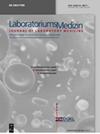DIN EN ISO 15189对临床病毒学结果正确性的影响
IF 0.1
Q4 OTORHINOLARYNGOLOGY
Laboratoriumsmedizin-Journal of Laboratory Medicine
Pub Date : 2016-01-28
DOI:10.1515/labmed-2016-0037
引用次数: 1
摘要
迄今为止,德国有400多家医学实验室通过了DIN EN ISO 15189(医学实验室-质量和能力要求)的认证。2014年,德国发布了新版DIN EN ISO 15189标准。本标准包括总体标准,但不包括检验医学某些学科的具体要求。本研究考察了技术要求,主要是质量保证和分析方法,如何影响临床病毒学结果的正确性。来自实验室,工业,DAkkS(德国认证机构)和标准化的专家进行了采访。定性内容分析表明,满足技术要求提高了检查结果的正确性,最大限度地降低了患者护理和安全的风险。此外,我们研究了有效的内部质量控制、测定控制以及附加控制如何确保hiv -p24抗原和抗hbs结果。DIN EN ISO 15189推荐的其他控制(所谓的“运行控制”)清楚地表明HIV抗原测量的不准确性,这些不准确性是制造商控制无法检测到的。同样,对于抗hbs检查,制造商提供的这种内部控制并不能保证正确的结果。因此,我们得出结论,通常通过认证确认的DIN EN ISO 15189对临床病毒学结果的正确性有积极影响,最终改善患者护理。本文章由计算机程序翻译,如有差异,请以英文原文为准。
Influence of DIN EN ISO 15189 on the correctness of results in clinical virology
Abstract To date more than 400 medical laboratories in Germany are accredited based on DIN EN ISO 15189 (Medical laboratories – requirements for quality and competence). In Germany, a new version of the DIN EN ISO 15189 has been published in 2014. This standard includes overall criteria but no requirements specific for certain disciplines of laboratory medicine. The present study examined how technical requirements, mainly for quality assurance and analytic methods, influence the correctness of results in clinical virology. Experts from laboratories, industry, DAkkS (German Accreditation Body) and from standardization have been interviewed. The qualitative content analysis showed that fulfilling technical requirements increased the correctness of examination results and minimized the risks for patient care and safety. Furthermore, we studied how effective internal quality controls, assay-controls as well as additional controls, assure HIV-p24-antigen and anti-HBs results. Additional controls recommended by DIN EN ISO 15189 (so called “run controls”) clearly indicated inaccuracies of HIV antigen measurement that were undetected by manufacturer’s controls. Also for anti-HBs examination, such internal controls provided by the manufacturer did not guarantee correct results. Therefore, we conclude that fulfilling DIN EN ISO 15189, usually confirmed by accreditation, has a positive influence on correctness of results in clinical virology, ultimately improving patient care.
求助全文
通过发布文献求助,成功后即可免费获取论文全文。
去求助
来源期刊

Laboratoriumsmedizin-Journal of Laboratory Medicine
MEDICAL LABORATORY TECHNOLOGY-
CiteScore
0.80
自引率
0.00%
发文量
1
审稿时长
>12 weeks
期刊介绍:
Information not localized
 求助内容:
求助内容: 应助结果提醒方式:
应助结果提醒方式:


